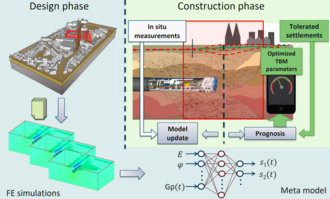Over-populated congested ‘mega-cities’ face significant issues with urban mobility and air pollution. Solution to that is the use of underground transportation as the most sustainable transport solution in terms of CO2 emissions, energy consumption, and noise levels. Therefore, we can see constantly growing underground transport networks. During the life-cycle of infrastructure projects, a large amount of data is collected, managed and processed to inspect the behaviour of the ground, the above-ground infrastructure, and the tunnel boring machine operation. In the operation and maintenance phase, the sensing of structural health is carried out by regular inspections according to design codes or best codes of practice. However, the current way of data management faces several limitations: i) the need for a life-cycle integration platform for information management and decision-making, ii) the lack of a platform-neutral, open data model for multi-scale representations of tunnelling and underground construction, and iii) the meaningful use of datasets of the tunnel design, the steering of the construction process, the detection of defects during the operation.
In our unified design-analysis-visualisation platform “SATBIM”, we developed a novel concept for on-demand design assessment in the design phase and process steering in the construction phase of tunnelling projects using simulation-based meta models for real-time prediction. Firstly, SATBIM is an integrated, open-source platform for information modelling, structural analysis and visualisation for mechanised tunnelling projects. Secondly, SATBIM employs machine learning techniques to generate meta models for real-time design assessment and real-time steering of construction operational parameters in both cases to minimise the environmental impact (e.g. settlements) of mechanised tunnelling.
More information can be found here.









